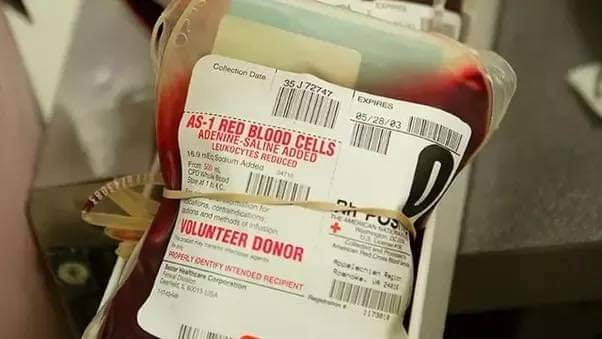SOME FACTS ON BLOOD COMPONENT THERAPY
- RED BLOOD CELLS
One unit of PRBCs (Hct about 70% and volume about 250 mL) usually will increase the Hct by 2% to 3% or the Hb by 1 g/dL in an euvolemic adult once equilibration has taken place.
PRBCs must be ABO compatible to the recipient.
- PLATELETS
One unit of platelets increases the platelet count by 5,000 to 10,000/mm3.
A usual platelet transfusion is 1 unit per 10 kg of body weight.
If thrombocytopenia is caused by increased destruction (due to development of antiplatelet antibodies) or if platelets are dysfunctional, platelet transfusions will be less efficacious.
Transfusion of ABO-compatible platelets is not obligatory, although they may provide a better posttransfusion platelet count.
Single-donor or HLA-matched platelets may be required for patients with a refractory response to platelet transfusion.
A unit of single-donor platelets provides the equivalent of approximately six random donor units of platelets.
- FRESH FROZEN PLASMA
Fresh frozen plasma (FFP), in a dose of 10 to 15 mL/kg, generally will increase plasma coagulation factors to 30% of normal, the minimal level necessary for hemostasis (excepting fibrinogen where 50% of the normal 200 to 400 mg/dL is required).
Fibrinogen levels increase by 1 mg/dL/mL of plasma transfused.
Acute reversal of warfarin is often achieved with only 5 to 8 mL/kg of FFP, although the PT may remain modestly prolonged.
FFP transfusions must be ABO compatible, but Rh compatibility and cross-matching are not required.
- CRYOPRECIPITATE
Cryoprecipitate is prepared from FFP and contains concentrated factor VIII, factor XIII, fibrinogen, von Willebrand factor (vWF), and fibronectin.
Indications for cryoprecipitate include
- hypofibrinogenemia,
- von Willebrand disease,
- hemophilia A (when factor VIII is unavailable), and preparation of fibrin glue.
Dosage is 1 unit per 7 to 10 kg, which will raise the plasma fibrinogen by about 50 mg/dL in a patient without massive bleeding.
ABO compatibility is not mandatory for cryoprecipitate transfusion
